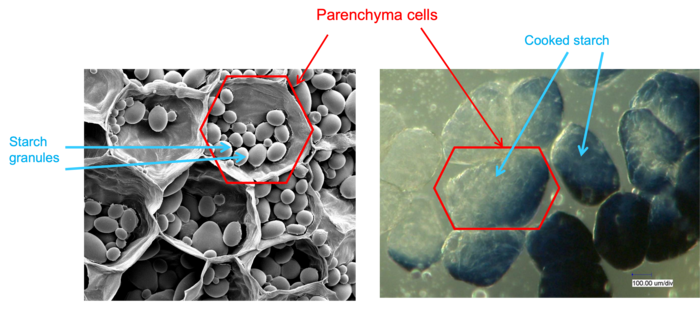Rockville, Maryland (June 14, 2022) — Researchers announced early tests of a new potato processing technique designed to make our bodies digest potato starch more slowly. Laboratory demonstrations show that the approach blocks certain digestive enzymes from reaching the potato starch as quickly, leading to a more controlled release of dietary glucose.

Credit: Amy Lin, A*STAR, and Yijing Shao and YuLian Lin, University of Idaho.
Rockville, Maryland (June 14, 2022) — Researchers announced early tests of a new potato processing technique designed to make our bodies digest potato starch more slowly. Laboratory demonstrations show that the approach blocks certain digestive enzymes from reaching the potato starch as quickly, leading to a more controlled release of dietary glucose.
“There is a perception that potato foods are unhealthy because eating a large amount of some potato foods can cause a rapid increase in blood sugar, which is a risk for people with diabetes or those who want to control body weight,” said Amy Lin, PhD, the study’s principal investigator and lead of the Food Carbohydrate Program of the Singapore Institute of Food and Biotechnology Innovation (SIFBI) at A*STAR. “Our team revealed that toggling the accessibility of two digestion enzymes — α-amylase and mucosal α-glucosidase — in the small intestine is a successful strategy to make dietary glucose slowly and continuously release from potatoes.”
Andrea Gomez Maqueo Cerecer, postdoctoral research fellow at A*STAR, will present the findings online at NUTRITION 2022 LIVE ONLINE, the flagship annual meeting of the American Society for Nutrition held June 14-16. The study was supervised by Lin, and other research team members included Grace Ng, Ru Min Bek and Jei Xi Wong.
For the new processing technique, researchers cut potatoes into cubes and blanched them in hot water with a food grade ingredient for 30 minutes. The ingredient used in the solution has been designated “generally recognized as safe,” a standard established by the U.S. Food and Drug Administration for substances considered safe for use in food.
This process causes a reaction with pectin, a water-soluble fiber in potatoes, creating a gelling structure that acts as a barrier between starch granules and digestive enzymes. This protective layer is porous, and the processing method allows the size of the pores to be controlled to moderate how quickly α-amylase is able to penetrate the potato parenchyma cells and degrade starch to small molecules. Converting starch molecules to glucose relies on mucosal α-glucosidase, which is too big to penetrate those pores. Therefore, the elevation of dietary glucose of processed potatoes depends on the how quickly small starch molecules leach out of parenchyma cells and are digested by mucosal α-glucosidase.
“Without our treatment, enzymes move freely in and out of cells, and starch is quickly degraded by both enzymes and rapidly converted to glucose,” said Lin. “The treatment allows the starch to be slowly degraded to prevent a spike in glycemia and then fully converted to glucose to meet our energy and nutritional needs.”
The technique is not designed to prevent the potato from being digested, but rather to slow digestion to avoid a rapid increase in blood sugar. Researchers say the modification could also help consumers feel full for a longer period after eating the treated potatoes, helping to avoid overeating.
Researchers report that the method performed well in tests with a simulated digestion process in the laboratory. Treatment increased the fraction of the starch that is considered slowly digestible from 10% to 35% and significantly reduced the ability for the enzyme a-amylase to access starch within the cell walls.
Since the process essentially pre-cooks the potatoes, treated potatoes are not shelf-stable but could be frozen and then cooked or further processed for dishes such as roasted potatoes, hash browns, soups or stir-fry, researchers say. Initial taste tests had good results in terms of digestibility and texture.
As a next step, the researchers are preparing to further test impacts on digestibility in a clinical trial. They also plan to study whether a similar approach could be used to improve other staple foods.
Andrea Gomez Maqueo Cerecer will present this research on-demand starting at noon on Tuesday, June 14, during the NUTRITION 2022 LIVE ONLINE Enhancing Human Nutrition with Advances in Food Science session (abstract; presentation details).
Please note that abstracts presented at NUTRITION 2022 LIVE ONLINE were evaluated and selected by a committee of experts but have not generally undergone the same peer review process required for publication in a scientific journal. As such, the findings presented should be considered preliminary until a peer-reviewed publication is available.
About NUTRITION 2022 LIVE ONLINE
NUTRITION 2022 LIVE ONLINE is part of a new year-around experience featuring ASN’s flagship annual meeting held virtually June 14-16, 2022, plus learning and networking opportunities that will be offered throughout the year. The online annual meeting is a dynamic virtual event showcasing new research findings and timely discussions on food and nutrition. Scientific symposia explore hot topics including clinical and translational nutrition, food science and systems, global and public health, population science and cellular and physiological nutrition and metabolism. https://nutrition.org/nutrition-2022/ #NutritionLiveOnline
About the American Society for Nutrition (ASN)
ASN is the preeminent professional organization for nutrition research scientists and clinicians around the world. Founded in 1928, the society brings together the top nutrition researchers, medical practitioners, policy makers and industry leaders to advance our knowledge and application of nutrition. ASN publishes four peer-reviewed journals and provides education and professional development opportunities to advance nutrition research, practice and education. http://www.nutrition.org/
Find more news briefs and tipsheets at: https://www.eurekalert.org/newsroom/nutrition2022. Watch on-demand sessions, view posters and more by registering for a free pass to attend the virtual meeting.
###




